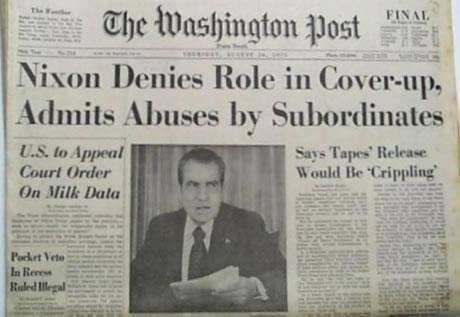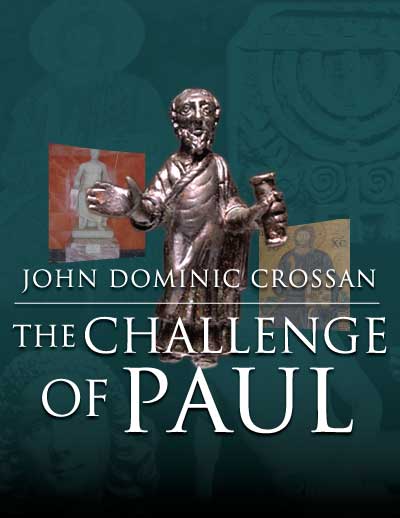Sometimes Religion Dispatches publishes something truly worthwhile.
This is one of those times:
As for revolutionary impact: embedded within Messianic-Christian Judaism is a significant level of disruptive social, political, and economic content. You can see some of that in the baptismal details given in Galatians 3:26-29. Claims of full equality between female and male or between master and slave (a Christian master could not have a Christian slave) were socially explosive. Thus it is not surprising, if also very saddening, to see how soon such visions of equality were de-radicalized back to Roman normalcy. In Colossians and Ephesians this de-radicalization is already fully evident.
In regard to the anti-sexual dimension, I view Paul himself as a programmatic celibate. I suspect that he was already one as a Pharisaic Jew (like other Jewish celibates in Egypt and Qumran) before he ever became a Messianic/Christian Jew. Bad theology can interpret celibacy to mean that sex is evil (but, of course, if it is evil or depraved, what virtue is there in abstaining from it?).
Paul intended his celibacy to offer personal witness that what civilization treats as “normal” (sex, marriage, children) is not an inevitability of human nature. In other words, if it is possible to abstain from sex, might it not also be possible to abstain from violence? Celibacy (or monastic silence, poverty, obedience) is a witness that the world that God so loved is not necessarily to be equated with the world that we so love.
The speaker is John Dominic Crossan. And this is where he gets more interesting:
At this point we have to take with equal seriousness both human evolution and the core of the biblical tradition—or either one separately, as I take the same message away from each.
For Jesus and Paul, it is never just about being against Rome. As you can see from Daniel 7, the alternative to imperialism—to the dreary succession of empires—is something the biblical writers call the Reign of God. What is mainly at issue is violence.
If you look at human evolution since our species surged out of Africa 70,000 years ago and announced its distinctiveness with the Neolithic/agricultural revolution, we have never created a weapon we did not use nor one less violent than the one it replaced. Looking at that trajectory, its mantra of “peace through victory” and its vain hope to control violence by more extreme violence, what future do we imagine for such a species?
I want to begin with that question because, without it, the biblical mantra of “peace through justice”—the claim that all should get a fair share of what belongs to us all—comes across as romantic at best and delusional at worst. What I am interested in is the point at which the biblical claim and human evolution intersect: the point where we might break through to a different way.
I do not know how many awakened people are needed to change this trajectory of escalatory violence (the default “normalcy” of civilization) or what we may have to go through if we are ever to attain it at all. I will simply say this, and I think Paul might agree with it: if you are not interested in biblical religion, then at least get interested in human evolution (Paul would call it “creation”).
Put simply, the effective counter to all imperialisms with their wars and violence will come not just from what you call the “counter-imperial valence” of good religion but from the force of human evolution itself. It is not just the moral arc but also the evolutionary arc of the universe that is long but bends towards justice.
Any interpretation of what Crossan means by "the force of human evolution itself" would have to be explained by him. Sounds a bit too much like Pinker's "angels of our better nature" to me (yes, I know Lincoln coined the phrase, but Pinker tried to make it a part of our evolutionary make-up). On the one hand, I'm inclined to reject such a reading of history and humanity as bunk. However, before you decide Crossan is out over his skis there,
he also says this in a separate interview:
DOM: Yes, Jesus’ challenge really was about the transformation of this world and this is not some secularism or humanism that I’m trying to push on people. This is based on the theology that this world belongs to God and it is good and can be transformed. That’s right out of the Bible. I don’t think the world ever will work by endlessly fighting wars in the hope that one more war somehow will bring peace. The problem is that, after each victory, the world gets more violent. In the Roman Empire, everyone thought Rome had brought a terrible new level of violence into the world. But, now, we have far more capacity for violence than Rome ever imagined.
Not exactly a vision of humanity moving inexorably toward perfection, there. I'm not looking to hang Crossan on his words in one interview or another; I'm looking to have a conversation with him, albeit a one-sided conversation. And yet I understand what he means because he says Paul would consider such talk to be about "creation." And that's a very loaded term. Not to mention the metaphor of the arc of the universe comes to us through the Rev. Dr. King, who got him from another pastor. So the metaphor itself is rich in theological and religious meaning. So we're not really inviting godless Darwinism into our Christian discussions. Crossan is offering a radical interpretation of evolution that fits within his Christianity. Especially since his Christianity is very much about this world, and not some sweet hereafter:
DOM: Yes, that’s right. When Caesar Augustus was called Savior of the World, everyone knew what that meant. It meant that 20 years of savage, devastating Roman Civil War was over. Augustus had ended that. He brought peace, finally. When people began applying that same title to Jesus, they weren’t talking about Jesus simply taking everybody away into some other world. They were saying that Jesus was the Savior of this world. They were talking about Jesus bringing a time of peace here in this world.
If you believe in God’s creation, it’s blasphemous to say that God blew it and that this world is evil and that, in fact, this world is such a bad mistake that it should be called back to the factory. No, Jesus was talking about the transformation of this world. Pilate would not have had Jesus crucified if Jesus was talking about some other world. Pilate would have said: “Oh, you’re only talking about some other world. Well, no problem, then. We Romans are only interested in ruling this world, thank you.” That’s why it was so radical when the same titles used in Roman Imperial Theology got shifted to Jesus. Pilate understood that Jesus really was a threat to the Roman world view.
DAVID: The Romans were saying that the only way to peace was through war and victory. Jesus taught that through God’s plan of justice and compassion, peace could be achieved in a dramatically different way. That’s still a deeply stirring message of hope 2,000 years later.
DOM: Yes, Jesus’ challenge really was about the transformation of this world and this is not some secularism or humanism that I’m trying to push on people. This is based on the theology that this world belongs to God and it is good and can be transformed. That’s right out of the Bible. I don’t think the world ever will work by endlessly fighting wars in the hope that one more war somehow will bring peace. The problem is that, after each victory, the world gets more violent. In the Roman Empire, everyone thought Rome had brought a terrible new level of violence into the world. But, now, we have far more capacity for violence than Rome ever imagined.
I repeated that last answer to put it back into the context of the source. I also want to directly rebut those who think Christianity is for children afraid of death and seeking assurance about something after death. Kind of hard to be concerned with transforming this world if you're afraid of death and hoping somebody will meet you "on the other side." The latter attitude has been the excuse to ignore this world and even leave it to its damnation; but as Crossan says, that's blasphemy, not Biblicism.

The problem here is talking to people like Crossan is not unlike talking to the children of Tama. Yeah, I know, fictional references are the worst, but the premise of the ST:NG show was an alien species that speaks English (don't they all?), but uses language to speak in metaphors and references to their stories (how they ever tell their stories to each other is another matter). The references function as a kind of shorthand, like "Romeo and Juliet" or "Jonah and the whale" would in our culture (neither of which means a thing in Asian cultures, for example). And here's where the comparison works: We are used to bumper-sticker Christianity, one focussed on the metaphysical in simple phrases like "Jesus Saves!" Which doesn't mean Jesus is a soccer goalie or the holder of a savings account; but why doesn't it? Because we know the "story" behind it, whether we believe it or not. To talk about "savior" as Crossan does, in that context, is nearly to engage in blasphemy. It can at least seem like obfuscation, because the only way we understand that phrase is metaphysically: what is "saved" is the "soul," and nothing else. When Crossan contrasts the Roman
pax with the Peace of God, he is keeping them in the same space: the space of the living. That can already make us think his ideas are contradictory, or at least contrary, and certainly over-complicated. However, Crossan is a Roman Catholic (a former candidate for the priesthood, IIRC), and it has never been RC theology that the world is irredeemably evil and the only hope for it is destruction and replacement; again, a metaphysical goal. And again, a conceptual barrier, especially to those of us steeped in Calvinist Protestantism.
I got into a minor argument with a commenter at RD on the Crossan article, on a similar point. My "opponent" insisted Christianity made factual claims it could not back up, and accused it's central claim, that Jesus is God and Messiah, to be based on "circular reasoning." I countered that the claims are confessional, like a claim that you love someone. You can't prove the "fact" that you are in love, but neither do you have to. Of course, my "opponent" considered all claims of faith by all Christians to be claims of fact (like the literalists and fundamentalists insist), and therefore the only claims Christians make at all. Bumper-sticker theology, in other words, is the only "real" theology; except, of course, it isn't. I can no more prove Jesus is God and Messiah than I can prove I love my wife. Even if my actions betray my claims, I confess to both. A confessional claim is not a claim to facticity; but if you don't understand that, you don't understand what Crossan is getting at, either.
And I think part of what he's getting at might be
Bonhoeffer's Christianity without religion. Crossan admits to a complicated relationship with the Church of Rome, but he doesn't seem inclined to abandon religion in his arguments. On the other hand, the emphasis on the wisdom tradition (it is the state of the world which is paramount) v. an emphasis on a more traditionally Christian metaphysical tradition (it is the state of your eternal soul which is paramount), raises Bonhoeffer's issue. Essentially, Crossan doesn't want to set aside Biblical claims of peace through justice, "which come across as romantic at best and delusional at worst," so like the project of Bultmann and others in the middle of the last century, he wants to find a contemporary vocabulary in which to speak his truth, which is why he brings "evolution" to the discussion (and threatens to sound more than a little like Tielhard de Chardin). We don't have to agree with Crossan, or reject Crossan, to consider Crossan's effort and evaluate it.
First, you can't push that too far, or you step away from the confessional claim ("Jesus is Lord," for Christians) and find yourself defending indefensible, and unasserted, factual claims ("Jesus is God" is not a claim subject to empirical proof). The question is not how you say it, the question is what does it mean to you? The claim that I love my wife is ultimately mine alone; but it involves people other than my wife, such as our family (her siblings and mine), our child, our friends; it may even involve society, if my behavior radically contradicts my claims (through violence, say). But it is never a claim subject to empirical proof, and no one expects it to be. Indeed, the insistence that claims of God's existence or Jesus' divinity is an insistence on empiricism that we don't really live by in most of our lives. Who are your friends? How do you empirically establish that "fact"? Does it bother anyone that you can't? It would probably bother them more if you tried. And if friendship does not qaulify as your "ultimate concern," certainly whatever meaning for life you have, does: even if that meaning is simply to vanquish your rhetorical foes, or to cause them grief as an internet troll.
How do you prove anything truly meaningful to your life, except by proclaiming that it is? "Believe me," the President insists, time and again; and that insistence is a pitiful cry to be taken as a meaningful person. We all, to some degree, engage in the same practice, and looking too closely at Trump can make you feel like you are starting to look at yourself. But most of us aren't quite so empty that we need to be filled by the attention of others to the degree Trump does (or at least acts like he does). Ultimately we find meaning in others: in a loving relationship, or in close friendships; success in business, or in family. None of these relationships rests on an empirical proof, and those who do seem to base their lives on empirically established facts are generally the most pitiful of all. So it isn't that religion opposes empiricism; it is that religion has almost nothing to do with empiricism.
Which brings us back to Crossan's attempt to use the concept of evolution as equivalent to the Judeao-Christian concept of creation. Part of the problem there is that the popular conception of creation is what he's invoking; but that conception is ultimately groundless. Evolution does not describe a process of improvement and perfection; it does not describe a goal, except the goal of survival. Survival, in evolutionary terms, is a blind process. Why are we here and the dinosaurs aren't? Happenstance, and nothing more. That, at least, is the answer of evolution. We are not an "improvement" on the dinosaurs, we just came after the cataclysm that wiped them out (although it took many years to happen; it wasn't brief enough to be the end of "Rite of Spring" in
Fantasia.), It may well be sound theology to say creation is following the arc that bends toward justice, but it is terrible science to assert that. Trying to sound more than religious, we end up muddled. It's an unavoidable effort, however; after all, Paul was a Pharisee writing in Greek to Gentiles. There's a lot of cultural cross-contamination going on there, along with Paul trying not to make any claims that will get him in trouble with the powers that be like Jesus did.* But the alternative gets us perilously close to the Protestant emphasis on sin, and what's needed to first overcome that (because creation is good but human sin corrupts it, as well as human society). Lots of needles to still thread here.
And part of the problem is speaking in the language of the world, rather than in the language of theology. That was the problem with
the attempt of Bultmann, et al., to "demythologize" Christianity. Focussing on the mythology so much, they made Christianity all about the mythology, or what I would call the metaphysics. Crossan's antidote for that is sound, but threatens itself to go too far, and that's where we run into the "Christianity without religion" aspect again; although I'm less and less sure that's a bad thing, especially if we take the point of Christianity to be "how should we then live" rather than "how should we then be saved?". Paul was writing in the language (and ideas) of his day, to people who were not born Christians (i.e, did not live in a Christian culture). More and more the church faces a post-Christian culture, which puts us back almost to the world Paul knew. Paul adopted the language of his time; can we adopt the language of ours, without adopting also the ideas (like evolution) that don't really fit our concepts ( like creation).
If we do, it could have a revolutionary impact.
*which neither marks Paul as a coward, nor condemns his approach as "impure;" it's simply a reality we have to take account of.













